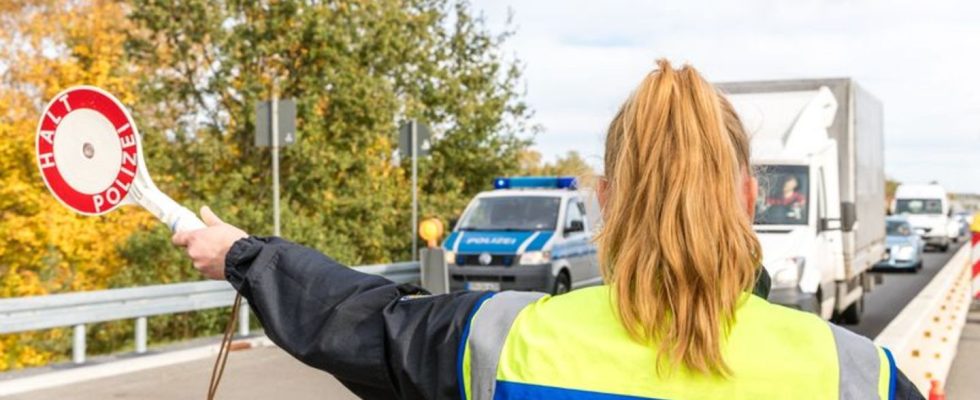migration
Fewer unauthorized entries into Germany
From November 1st to 23rd, the federal police detected a total of 4,353 unauthorized entries at the land borders. photo
© Frank Hammerschmidt/dpa
The border controls are having an effect. But how smugglers will react to this in the medium term remains to be seen. The fact that some of them recently attacked each other could be one reason why fewer people are currently coming to Germany without permission.
The number of unauthorized entries Germany fell sharply in November compared to the previous month. As can be seen from a response from the federal government to a question from MP Clara Bünger (Left), the federal police detected a total of 4,353 unauthorized entries at the land borders from November 1st to 23rd and ordered 2,299 rejections.
In the month of October, 18,384 unauthorized entries were counted at the German land borders – the majority of them in the first half of the month. The comparison to the months of previous years also illustrates the relatively low numbers: In the entire month of November 2021, the federal police detected 7,543 unauthorized entries at all borders; in November last year there were 12,538 unauthorized entries.
According to the information, there was a significant decline in the first weeks of November not only at the borders with Poland, the Czech Republic and Switzerland, where there have been fixed border controls since October 16th, but also at the border with Austria. Such inpatient checks were already ordered there in autumn 2015 and have been repeatedly extended since then.
According to preliminary figures from the Federal Police, 921 people who entered the country illegally were found at the German-Austrian land border between November 1st and 23rd and 493 people were ordered to be turned back. In the previous month, more than 6,921 people who entered the country illegally were found there. The most important countries of origin of the 4,820 people who were rejected at Germany’s borders in October were Turkey, Syria, Afghanistan and Morocco.
Austria and Slovakia have increased border controls
However, the police union (GdP) suspects that the sharp decline in recent weeks can only be attributed to a small extent to the border controls ordered by Federal Interior Minister Nancy Faeser (SPD) in mid-October. However, observers see a certain domino effect, meaning that neighboring states and their neighbors have subsequently strengthened their own border protection. Andreas Roßkopf, responsible for federal police and customs at the GdP, notes that Austria and Slovakia have recently intensified their border controls with Hungary.
This effect is definitely desirable, says the Union faction’s domestic policy spokesman, Alexander Throm, who – like Minister Faeser – describes the border controls as successful. However, the CDU politician emphasizes: “Border controls are not a panacea.” Germany also needs to do better when it comes to returning rejected asylum seekers. In order to avoid false incentives, foreigners who have already applied for asylum in another EU country should, in his opinion, only receive a transitional allowance in the future “and the travel costs so that they can return to this country.”
There are no border controls within the Schengen area
Roßkopf also attributes the decline in detected unauthorized entries to a temporary special effect. He says: “According to our findings, rival smuggling organizations had a heated argument and as a result many migrants were initially not smuggled any further.”
However, it is to be expected that the various smuggler networks will soon try to find new ways to bring people to Germany in exchange for money. “Border controls do not prevent people from needing asylum, they only make escape routes even more dangerous,” said Bünger. The fact that those seeking protection now have to resort to other routes in sub-zero temperatures and snow chaos is unacceptable for humanitarian reasons.
Border controls are not actually planned within the Schengen area and must be reported to Brussels. If it is only a matter of a few days, this can be done with a short notice. However, this option ends after two months, in the case of Germany on December 15th. However, observers expect – not least because Chancellor Olaf Scholz (SPD) announced this in the Bundestag – that Faeser will stick to the controls at least at the borders with Poland and the Czech Republic in the long term and will inform the EU Commission about this soon.
GdP complains about working conditions for federal police officers
Bünger – like several members of the Green parliamentary group – is calling for a reversal. The fact that stationary controls on the German-Austrian border have now become a permanent situation violates EU law and must be ended – instead of extending this practice to other sections of the border.
Meanwhile, the GdP is campaigning for better working conditions for the federal police officers who are now patrolling these sections of the border. At the end of November, Roßkopf sent a letter to Faeser in which he complained: “The working conditions currently expected of employees are scandalously bad in many places, primitive and, at best, provisional.” In some cases there was a lack of sufficient lighting systems, heated control shelters and toilets. Some riot police employees reported that weatherproof jackets sometimes had to be cleaned and replaced on a weekly basis because there were not enough thermal jackets for everyone.

